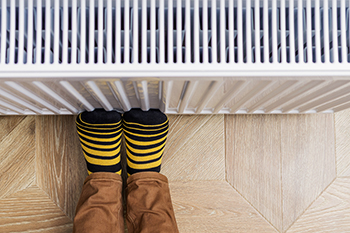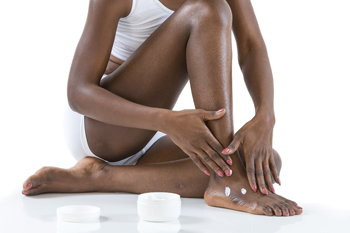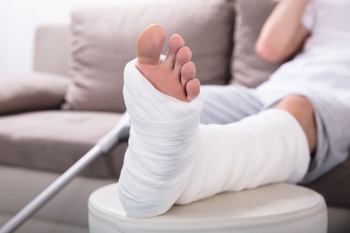Connect With Us
Blog
Items filtered by date: February 2022
Are Bunions Affecting Your Everyday Life?
How to Deal With Chronic Foot Pain
When your feet hurt, it is not easy to to do any form of exercise. However, it is thought that being active can actually help to reduce pain in the long run. If putting weight on your feet for any period of time is simply too painful, taking to the water might help. Exercising in a pool eliminates the pressure on your feet while allowing you to move other parts of the body. Applying ice to the sore areas of your feet is another way to reduce the pain. Taking non-steroidal anti-inflammatory medication, available over the counter, can also help. Devices such as canes, walking sticks, or walkers can absorb some of the weight placed on your feet when you stand or walk. Also, check that your footwear is comfortable, roomy, cushioned and supportive. Another key contributor to foot pain is being overweight, so the combination of a healthier diet and added exercise will likely be beneficial. If your pain increases or becomes unbearable, it’s a good idea to consult a podiatrist for a complete examination and diagnosis, as well as other treatment options.
Foot Pain
Foot pain can be extremely painful and debilitating. If you have a foot pain, consult with Vivian C. Iwu, DPM from Choice Podiatry Center. Our doctor will assess your condition and provide you with quality foot and ankle treatment.
Causes
Foot pain is a very broad condition that could be caused by one or more ailments. The most common include:
- Bunions
- Hammertoes
- Plantar Fasciitis
- Bone Spurs
- Corns
- Tarsal Tunnel Syndrome
- Ingrown Toenails
- Arthritis (such as Gout, Rheumatoid, and Osteoarthritis)
- Flat Feet
- Injury (from stress fractures, broken toe, foot, ankle, Achilles tendon ruptures, and sprains)
- And more
Diagnosis
To figure out the cause of foot pain, podiatrists utilize several different methods. This can range from simple visual inspections and sensation tests to X-rays and MRI scans. Prior medical history, family medical history, and any recent physical traumatic events will all be taken into consideration for a proper diagnosis.
Treatment
Treatment depends upon the cause of the foot pain. Whether it is resting, staying off the foot, or having surgery; podiatrists have a number of treatment options available for foot pain.
If you have any questions, please feel free to contact our office located in Marietta, GA . We offer the newest diagnostic and treatment technologies for all your foot care needs.
Top 4 Conditions That Cause Cold Feet
If your feet always feel cold, it may be due to one of the following four reasons. 1) You may have poor circulation. Feet need a steady flow of blood to keep them warm. Poor circulation causes blood vessels to constrict which limits the amount of blood traveling to the feet. 2) You may have Raynaud’s syndrome. This is a condition where blood vessels that supply the skin with blood constrict and spasm temporarily, thereby limiting blood flow. This may even cause your skin to change colors temporarily as blood flow is cut off and then returns. 3) You may be overly stressed or anxious. The body’s reaction to extreme stress or anxiety may trigger a “fight or flight” response which can direct blood flow towards larger organs—which are more critical to survival—and away from the extremities. 4) You may have anemia, which is an insufficient amount of red blood cells. Anemia reduces the amount of oxygen in the blood, sometimes causing cold feet. If you are concerned about your feet always feeling cold, contact a podiatrist to determine what the underlying cause may be and to get the appropriate treatment.
Poor circulation is a serious condition and needs immediate medical attention. If you have any concerns with poor circulation in your feet contact Vivian C. Iwu, DPM of Choice Podiatry Center. Our doctor will treat your foot and ankle needs.
Poor Circulation in the Feet
Poor blood circulation in the feet and legs is can be caused by peripheral artery disease (PAD), which is the result of a buildup of plaque in the arteries.
Plaque buildup or atherosclerosis results from excess calcium and cholesterol in the bloodstream. This can restrict the amount of blood which can flow through the arteries. Poor blood circulation in the feet and legs are sometimes caused by inflammation in the blood vessels, known as vasculitis.
Causes
Lack of oxygen and oxygen from poor blood circulation restricts muscle growth and development. It can also cause:
- Muscle pain, stiffness, or weakness
- Numbness or cramping in the legs
- Skin discoloration
- Slower nail & hair growth
- Erectile dysfunction
Those who have diabetes or smoke are at greatest risk for poor circulation, as are those who are over 50. If you have poor circulation in the feet and legs it may be caused by PAD and is important to make changes to your lifestyle in order to reduce risk of getting a heart attack or stroke. Exercise and maintaining a healthy lifestyle will dramatically improve conditions.
As always, see a podiatrist as he or she will assist in finding a regimen that suits you. A podiatrist can also prescribe you any needed medication.
If you have any questions please feel free to contact our office located in Marietta, GA . We offer the newest diagnostic and treatment technologies for all your foot and ankle needs.
Good Foot Care Can Be Easy
In our increasingly fast-paced world, many people feel that they don’t have any extra time to devote to their foot health. However, looking after your feet doesn’t have to be a time-consuming hassle. A few quick and easy things that you can do include keeping your feet clean and dry, moisturizing your heels to prevent cracks, and checking your feet regularly for anything unusual, such as injuries, discoloration, swelling, or pain. If you have otherwise healthy feet, then you could spend as little as 10 minutes per week giving them a little extra care to keep them healthy. People with pre-existing conditions, such as diabetes, may require more foot care. To learn more about caring for your feet, please consult with a podiatrist.
Everyday foot care is very important to prevent infection and other foot ailments. If you need your feet checked, contact Vivian C. Iwu, DPM from Choice Podiatry Center. Our doctor can provide the care you need to keep you pain-free and on your feet.
Everyday Foot Care
Often, people take care of their bodies, face and hair more so than they do for their feet. But the feet are a very important aspect of our bodies, and one that we should pay more attention to. Without our feet, we would not be able to perform most daily tasks.
It is best to check your feet regularly to make sure there are no new bruises or cuts that you may not have noticed before. For dry feet, moisturizer can easily be a remedy and can be applied as often as necessary to the affected areas. Wearing shoes that fit well can also help you maintain good foot health, as well as making it easier to walk and do daily activities without the stress or pain of ill-fitting shoes, high heels, or even flip flops. Wearing clean socks with closed shoes is important to ensure that sweat and bacteria do not accumulate within the shoe. Clean socks help to prevent Athlete’s foot, fungi problems, bad odors, and can absorb sweat.
If you have any questions please feel free to contact our office located in Marietta, GA . We offer the newest diagnostic and treatment technologies for all your foot and ankle needs.
Osteoporosis and Foot and Ankle Health
Osteoporosis is a bone disorder that causes the bones to become thin, brittle, and weak due to a lack of calcium and vitamin D. Although it is particularly common in women over 50, younger people and men can also develop osteoporosis. Since osteoporosis weakens the bones, it makes fractures more likely. Often, the first sign of osteoporosis is a broken bone in the foot. Symptoms of this include pain, redness, and swelling around the site of the fracture, and difficulty walking. A podiatrist can diagnose a broken foot bone through physical examination and X-rays. If you suspect that you may have broken a foot bone, or if you have been previously diagnosed with osteoporosis and want to learn more about preventing foot fractures, it is suggested that you consult with a podiatrist today.
A broken foot requires immediate medical attention and treatment. If you need your feet checked, contact Vivian C. Iwu, DPM from Choice Podiatry Center. Our doctor can provide the care you need to keep you pain-free and on your feet.
Broken Foot Causes, Symptoms, and Treatment
A broken foot is caused by one of the bones in the foot typically breaking when bended, crushed, or stretched beyond its natural capabilities. Usually the location of the fracture indicates how the break occurred, whether it was through an object, fall, or any other type of injury.
Common Symptoms of Broken Feet:
- Bruising
- Pain
- Redness
- Swelling
- Blue in color
- Numbness
- Cold
- Misshapen
- Cuts
- Deformities
Those that suspect they have a broken foot shoot seek urgent medical attention where a medical professional could diagnose the severity.
Treatment for broken bones varies depending on the cause, severity and location. Some will require the use of splints, casts or crutches while others could even involve surgery to repair the broken bones. Personal care includes the use of ice and keeping the foot stabilized and elevated.
If you have any questions please feel free to contact our office located in Marietta, GA . We offer the newest diagnostic and treatment technologies for all your foot and ankle needs.






